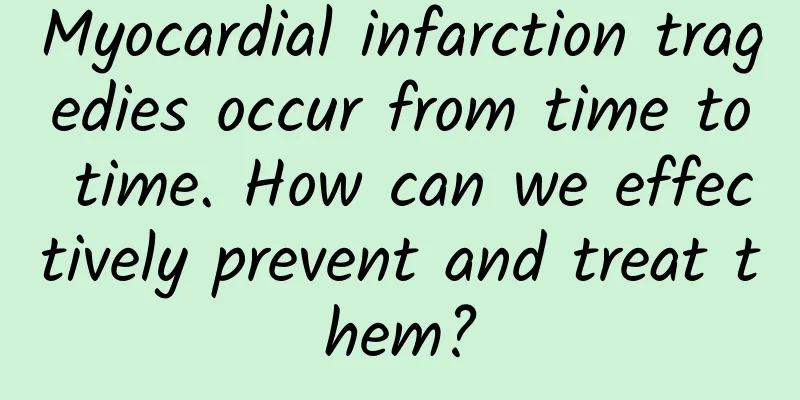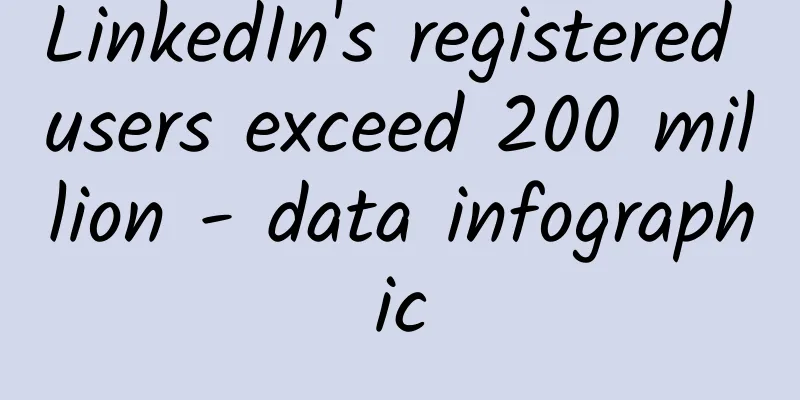Myocardial infarction tragedies occur from time to time. How can we effectively prevent and treat them?

|
This is the 2862nd article of Da Yi Xiao Hu Cardiovascular disease has always been the number one killer of national health. According to statistics, about 3.5 million people die from cardiovascular disease in my country each year, accounting for more than 40% of the deaths from diseases among residents; among them, there are 600,000 new cases of myocardial infarction each year, and only 30,000 cases receive timely and standardized treatment. In recent years, various cardiovascular diseases have shown a trend of "younger age", young people in their twenties and thirties have been diagnosed with myocardial infarction, and sudden death has occurred frequently, which has undoubtedly become a serious burden and worry for families and society. What are the risk factors for myocardial infarction? 1. Past medical history Myocardial infarction often occurs on the basis of coronary atherosclerosis and stenosis. Due to certain factors, the coronary atherosclerotic plaques rupture, and the platelets in the blood gather on the surface of the ruptured plaques to form blood clots (thrombi), which suddenly block the coronary artery cavity and cause myocardial ischemia and necrosis. If the patient has high blood pressure, high blood lipids, diabetes and other diseases, the risk of myocardial infarction will increase. 2. Age and Gender The incidence of myocardial infarction increases with age. For every 10 years of age, the risk of cardiovascular disease increases by about 1 time. In addition, men are 20% more likely to have myocardial infarction than women. 3. Genetic factors The 2017 American Heart Association Heart Disease and Stroke Statistics Report shows that 12.2% of adults have a parent or sibling who has suffered a myocardial infarction or angina before the age of 50. The probability of myocardial infarction increases when a first-degree relative (i.e., a parent or sibling) has developed atherosclerotic cardiovascular disease or died of cardiovascular disease before the age of 55 (male) or 65 (female). 4. Lifestyle An unhealthy lifestyle can greatly increase the chance of myocardial infarction. This includes smoking, unhealthy diet, lack of exercise, obesity, mental stress, overwork, emotional agitation, lack of sleep, heavy drinking, etc. We often see reports such as "36-year-old IT man graduated from Tsinghua University died suddenly on the toilet, and told his mother "too tired" before his death?", "Chunyu doctor Zhang Rui died of a sudden myocardial infarction, and said before his death that he "did not eat or sleep well, and was anxious every day". These bloody events also tell us the importance of establishing a good lifestyle. How to quickly identify myocardial infarction? The most typical symptom of myocardial infarction is squeezing pain behind the sternum. Patients often describe this pain as a feeling of squeezing, chest tightness, chest compression (like an elephant sitting on the chest), depression, chest tightness, and restraint. This pain does not change with activity or change of body position, often lasts for more than 10 minutes without relief, and is accompanied by symptoms such as profuse sweating, rapid breathing, nausea and vomiting, and fatigue. The pain of myocardial infarction patients will also radiate to other parts of the body, including the upper abdomen, neck and shoulders, upper limbs, throat, mandible and teeth. Some myocardial infarction patients may only show persistent toothache, stomachache, sore throat, shoulder and back pain, etc. There is a saying that "pain below the nose and above the navel may come from the heart", which needs to be paid attention to, so as not to delay rescue time. In addition, some patients also present with atypical symptoms, including simple dyspnea, weakness, nausea and/or vomiting, upper abdominal pain or discomfort, diarrhea, palpitations, syncope or cardiac arrest, etc. These symptoms are more common in elderly patients, diabetic patients and female patients, and must be vigilant. The simplest way to diagnose myocardial infarction is electrocardiogram, which is more complete when combined with blood tests. What should I do if I suddenly have a myocardial infarction? For patients with myocardial infarction, "time is myocardium, time is life." The myocardium begins to necrotize about 30 minutes after blood vessel blockage. During this period, the sooner the blocked blood vessel is opened, the more myocardium will survive. There is often a saying of "golden hour" for first aid of acute myocardial infarction. If a myocardial infarction can be effectively rescued within 1 hour, the patient will be the same as a normal person after recovery. However, if rescued after 1 and a half hours, the myocardium will become necrotic, and the longer the time, the more myocardial necrosis will occur. Unfortunately, half of the patients missed the opportunity for first aid due to their own or their family's reasons. Therefore, it is very important to improve everyone's first aid knowledge for acute myocardial infarction. When a myocardial infarction is suspected, you should: 01 Call for help Dial 120 emergency number and first inform the accurate home address on the phone; keep the line open; also inform relatives and friends that if no one is at home, they need to open the door to facilitate the entry and exit of rescue personnel. 02 rest Lie down on the spot or find a suitable lying position to rest. At this time, you should breathe slowly and deeply, reduce activities, try to reduce oxygen consumption, and never try various unreliable self-rescue methods. 03 Use drugs with caution Myocardial infarction is different from angina pectoris. Nitroglycerin can relieve symptoms during an angina attack, but if it is a myocardial infarction, it is difficult to relieve the pain by taking nitroglycerin. If the patient's blood pressure is already low, the condition will worsen after taking nitroglycerin. It is not recommended to take nitroglycerin tablets blindly. When it is determined that the blood pressure is not low, taking nitroglycerin can help identify whether it is a myocardial infarction. If it is ineffective after taking it three times, it is likely a myocardial infarction. In addition, taking aspirin during a heart attack can help prevent blood clotting and thus reduce heart damage, but aspirin can interact with other drugs and will make subsequent disease treatment difficult. Therefore, both drugs should be taken with caution, and it is best to take them after getting the advice of an emergency doctor. 04 Oxygen If oxygen is available, give oxygen immediately. 05 Heart compressions If the patient's heart suddenly stops beating, breathing stops, and the patient becomes unconscious, external cardiac compression should be performed immediately (100-120 times per minute, compression depth 5-6cm) until the doctor arrives. How to use nitroglycerin when angina pectoris occurs suddenly? Earlier, we mentioned that if nitroglycerin is used incorrectly, it can also cause low blood pressure, fainting, and even death. Nitroglycerin can be used in the following situations: Contraindicated for people with low blood pressure While nitroglycerin dilates coronary arteries, it also dilates other blood vessels. If people with blood pressure below 90/60 mmHg take it, it may lower their blood pressure even further. Contraindicated in patients with glaucoma or increased intracranial pressure Nitroglycerin can increase brain and intraocular pressure and should not be used in patients with glaucoma or increased intracranial pressure. Do not take it at the same time as Viagra Viagra dilates the blood vessels in the corpus cavernosum of the penis, enhancing the vasodilatory effect of nitroglycerin; Contraindicated in early stage of myocardial infarction It should be contraindicated in the early stages of myocardial infarction when there is severe hypotension and tachycardia. Special reminder: When the emergency doctor assesses the patient's physical condition and recommends taking nitroglycerin, please pay attention to: Three times the limit If taking a tablet of nitroglycerin sublingually is ineffective, you should take another tablet after 5 minutes, and repeat this 3 times. If it is still ineffective, you should consider the possibility of myocardial infarction or other diseases, and do not increase the dosage without authorization. Sublingual The capillaries under the tongue are very rich, and the drug is quickly absorbed into the blood, and the analgesic effect occurs in 1 to 2 minutes. However, swallowing is slow to absorb and the effect is poor. If you chew it first and then press it under the tongue, the effect will be faster, because the chewed drug is easier to be quickly absorbed through the sublingual mucosa and enters the coronary artery in a relatively short time. Avoid standing Nitroglycerin has a more obvious dilation effect on cerebral blood vessels. After taking the medicine, the patient will have a flushed face and headache, and orthostatic hypotension will occur when standing, which may easily lead to fainting. Elderly patients or patients taking the medicine for the first time will feel dizzy and have a headache after taking the medicine while sitting. As long as they lie down to rest or take symptomatic treatment, they will soon return to normal. As the medication time increases, this effect will gradually decrease and even disappear. Reasonable preservation The physical and chemical properties of nitroglycerin are very unstable, so it is required to be stored below 20°C and protected from light. In addition, the shelf life of nitroglycerin is generally 1 year. If the lid is opened and taken out repeatedly every day, the drug is affected by temperature, humidity and light, and its shelf life is only 3 to 6 months. Therefore, when using nitroglycerin, pay attention to the shelf life. Each time you take the drug, you should open and close the lid quickly, and cover it tightly after use. It is best to replace nitroglycerin every 3 to 6 months. Tips: Nitroglycerin vs. Quick-acting Heart-saving Pills Suxiao Jiuxin Pills are also a good medicine for treating angina pectoris caused by coronary heart disease. They are composed of Chinese medicines such as Chuanxiong and borneol. They have the effects of promoting qi and blood circulation, removing blood stasis and relieving pain, and can relieve angina pectoris. The general usage is also sublingual, 4 to 6 pills at a time, 3 times a day; in case of acute attack, 10 to 15 pills at a time. The results of a few clinical controlled studies have shown that when used for emergency treatment of angina pectoris, whether it is to relieve clinical symptoms or improve the ischemic manifestations of electrocardiograms, the efficacy of Suxiao Jiuxin Pills is no less than that of nitroglycerin tablets. Generally speaking, in the case of acute angina pectoris, nitroglycerin should be the first choice because it has a clear effect and a fast onset. However, when the patient has contraindications to nitroglycerin, cannot tolerate nitroglycerin, or nitroglycerin is ineffective, Quick-Acting Heart-Saving Pills can be used. In addition, studies have shown that Quick-Acting Heart-Saving Pills have little or no effect on blood pressure and heart rate. When there is severe hypotension and tachycardia, Quick-Acting Heart-Saving Pills can be used How to prevent myocardial infarction? 1. Develop a healthy lifestyle Not smoking, increasing physical exercise appropriately, improving sleep, eating a healthy diet, maintaining a healthy weight, and staying relaxed are all crucial for preventing myocardial infarction and recovering after myocardial infarction. These are irreplaceable by any medicine or treatment. 2. Regular physical examinations It is extremely important to have a physical examination every year to understand your physical condition, especially for middle-aged and elderly people. In addition, in addition to routine examinations, a carotid artery ultrasound examination can be added. The non-invasive ultrasound can determine the progress of atherosclerosis. If carotid artery plaques are found and there are multiple risk factors (such as middle-aged men, smoking, three highs, etc.), the doctor will recommend that the patient immediately start aspirin and statin treatment. 3. Drug prevention After a myocardial infarction occurs, antiplatelet drugs need to be taken for a long time. In addition, you also need to choose to take some drugs under the guidance of a doctor and pharmacist, such as beta-blockers, angiotensin-converting enzyme inhibitors (ACEI)/angiotensin II receptor antagonists (ARB), lipid-lowering drugs, etc. Do not stop taking the drugs at will. References: 【1】Uptodate: Initial evaluation and treatment of suspected acute coronary syndrome (myocardial infarction, unstable angina) in the emergency department 【2】Thygesen K, Alpert JS, Jaffe AS, et al. Fourth universal definition of myocardial infarction (2018). Eur Heart J, 2018. 【3】Drug instructions: Nitroglycerin, Quick-acting Heart-saving Pills 【4】Arslan F, Bongartz L, Ten JB, et al. 2017 ESC guidelines for the management of acute myocardial infarction in patients presenting with ST-segment elevation: comments from the Dutch ACS working group.[J]. Netherlands Heart Journal Monthly Journal of the Netherlands Society of Cardiology & the Netherlands Heart Foundation, 2018, 26(9):1-5. Author: Zhejiang Provincial Hospital of Traditional Chinese Medicine Fan Ting, Wang Jianping |
<<: The truth about stuttering
>>: What are the special foods in Pattaya, Thailand? What are the three wonders of Pattaya?
Recommend
The blood is pink on the seventh day of abortion
Medical abortion is a relatively common method of...
Ovarian hematoma is caused by
In fact, for girls, the ovaries are a very import...
How to calculate the accurate date of pregnancy
Parents of first-time children are more cautious ...
Gynecological physical therapy and nursing care
With the improvement of living standards, more an...
What causes breast cancer?
The occurrence of breast cancer can cause great h...
What time is considered staying up late for girls?
Staying up late often is a phenomenon that is oft...
Complications after interventional embolization
Uterine artery embolization surgery is an interve...
Why do I keep dreaming after I get pregnant?
I often hear women say that they used to sleep ve...
How many days does the stringy vaginal discharge last during ovulation?
Vaginal discharge is a reflection of whether ther...
Glucocorticoids - a "double-edged sword" for treating IgA nephropathy. 6 questions and 6 answers to help you use them clearly!
IgA nephropathy (IgAN) is a primary glomerular di...
What to do if you have pubic lice?
Lice are a type of parasite that is common in ani...
Do refined carbohydrates pose health risks? How should we “eat well”?
Nowadays, people's eating is no longer limite...
What are the ways to maintain a woman's uterus?
As environmental pollution becomes more and more ...
Why does menstrual blood smell fishy?
Menstruation is a normal physiological phenomenon...
Preventing sagging breasts by not breastfeeding after childbirth
This is an era of beauty. Many mothers have recov...









